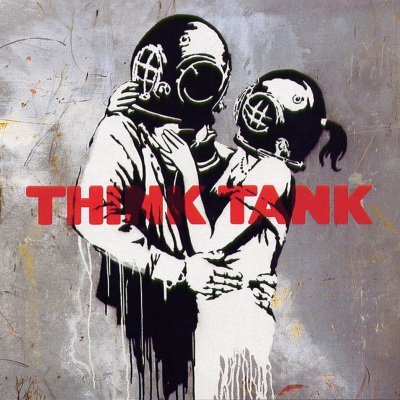
Think Tank
在blur的第七张录音室的作品《think tank》中,封面是带着防毒面具拥抱着的一对,而封底是带有防毒面具的妈妈怀中抱着同样装束的婴儿。我想我们都会以为这是一张反战的专集,其实不然,其中除了一首之前已经以单曲的发行过的《out of time》,这首用辛酸的歌词来配合反战的MTV故事的歌曲之外,剩下的更多的话题都集中在了他们如今的三人组合,以及吉他手Graham Coxon的离队的真正原因上。 在blur乐队着手准备这张新专集的时候,主唱Damon Albarn和吉他手Graham Coxon的关系就产生了微妙的变化,因为Albarn在虚拟组合Gorillaz的成绩使得他在乐队的地位变的更有说服力。而吉他手Coxon的吉他solo专集也受到了一部分的歌迷的支持。传闻最后让吉他手Coxon离队的倒火索是主唱Albarn邀请了fatboy slim来制作专集。这使得Coxon认为乐队的风格要变的舞曲化,而舆论也认为这是一个明显的信号。但是结果是fatboy slim只作了两首歌曲,而乐队优秀的吉他手Graham Coxon却离开了。不过鼓手Dave Rowntree表示他们不会再给乐队找一个固定的吉他手,也证实了Graham Coxon确实出现在了其中一首曲子里面(结尾曲"Battery In Your Leg"),也算是给歌迷一个小小的补偿。 这是一样保持了原色,又有新鲜尝试的作品。主打歌《out of time》,一首又旋律又有噱头的歌曲,在过度段落中溶入了阿拉伯曲风。《Sweet song》《good song》带着blur特有的气质抒情小品,让我们的在忧伤的旋律中找到Damon Albarn招牌式的假声。而《Brothers and sisters》反对的不是战争而是滥用的药物。 blur在这张专辑中最大胆的尝试就是演绎了一首融合了中东音乐风格的punk歌曲《We’ve got file on you》,惊讶之余,个人认为还那么点意思,呵呵。 《jets》是专集中最富有实验的一首歌曲,居然用爵士的sexphone嫁接到英式的吉他小曲当中,更像是一首乐器音乐作品。听的我是一耳朵的茫然。 有些复古的摇滚气息《gene by gene》却是证实了blur在邀请了fatboy slim之后的一些变化。采样明显的增多,使歌曲多了些许的幽默和诙谐,当然他们没有舍弃自己的blur式的音乐结构和旋律走向。 结尾曲《battery in your leg》是吉他手Graham Coxon唯一参与的作品,吉他的感觉特象早期的pink floyd,非常迷幻,配上主唱Damon Albarn伤感,齐了,再不需要其它。 这样一张专辑,可以是blur的过度之作,但决不能是经典。因为少了吉他手Graham Coxon,这是一张三人的作品,而当上主角的Damon Albarn这是他初次独领的专辑,两方面都不成熟。 by Stephen Thomas Erlewine As Blur commenced recording on Think Tank, their seventh album, things got a little weird. Tensions between vocalist/songwriter Damon Albarn and guitarist Graham Coxon reached a boiling point following Albarn's success with his dance-oriented side project, Gorillaz, leading him to assert dominance over the band, all of which was at odds with a newly sober and somber Coxon, whose solo records were doggedly designed to appeal to small audiences. According to most press reports, the breaking point was Albarn bringing Fatboy Slim in for production work in Morocco (it's hard to write those words without believing them to be parody), leading toward Coxon's acrimonious departure and the turgid mess that is Think Tank. Given the Gorillaz and Fatboy Slim (who, after all the brouhaha, only produced two tracks) connections, it's easy to assume that Albarn is pushing Blur toward a heavy, heavy dance album, which isn't strictly true, partially because the band always have traded in alternative dance. Still, there's been a shift in approach. Where they used to use disco and house beats as a foundation (see "Girls and Boys" or "Entertain Me"), Blur now borrow modern dance's fondness, even reliance, on atmosphere over song and structure -- which is kind of ironic, of course, since the group have always excelled at song and structure in the past. In the post-Coxon era, all that's tossed aside as Albarn turns his attention to electronic art-rock as thin as a dime. Make no mistake, even if bassist Alex James and Dave Rowntree are along for the ride, this is the sound of Albarn run amuck, a (perhaps inevitable) development that even voracious Blur supporters secretly feared could ruin the band -- and it has. Why? Because Albarn's talents cry out for a collaborator. He has great ideas but he needs help not just in the execution, but sorting out what ideas are good. The problem is, he's charismatic enough to coast by on his book smarts and good looks, until somebody -- Coxon, Stephen Street, Dan the Automator -- calls him into check, and now that he's had enough success, he's convinced he can do it on his own. So, Think Tank is the Damon Show, and it reveals that the emperor has no clothes or sense. Apart from the fine, deliberate opening gambit of "Ambulance" and "Out of Time" -- the first a perfectly arranged, ominously lush mood piece; the other a hushed, melancholic elegy in the same vein as "To the End" and "Tender," though not as good as either -- Think Tank sounds for all the world exactly like Blur B-sides from Parklife to Blur, complete with the hiccupping analog synths and meandering instrumentals, but without the sense of songcraft and with less imaginative arrangements (remember, elastic codas with a noodling saxophone line do not equal experimental; it's lazy focus). Those songs that do sound more substantial than B-sides are severely hurt by Coxon's absence: Witness the pleasantly sweet "Good Song," built on a Pro-Tools acoustic guitar loop which drains the song of emotion, when Graham would have let the song breathe, or how the creepy crawl of "Battery in Your Leg" winds up eating its own tail through its hermetically sealed arrangement. These problems all derive from one simple thing -- since Albarn has nobody to challenge him, he's unwittingly pawning off an album of half-baked demos and unfinished B-sides. And this isn't the result of a musical departure, unless you count the departure of songwriting -- this is the sound of Blur without the hooks, smarts, tunes, or even the sense of adventure. Sure, it might be easier to accept if it was called a Damon Albarn solo album, but that's splitting hairs. A lousy album is a lousy album, no matter who gets credit.
